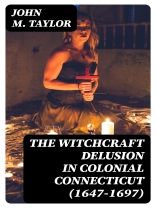In ‘The Witchcraft Delusion in Colonial Connecticut (1647-1697), ‘ John M. Taylor offers an incisive exploration of the sociopolitical and religious dynamics that fueled the witchcraft trials in Connecticut during the colonial period. Taylor employs a meticulous historical methodology, integrating primary sources, such as court documents, correspondences, and contemporary accounts, to illuminate the intricate factors that led to the vilification of individuals as witches. Written in clear, scholarly prose, the book situates these events within the larger framework of Puritan beliefs and the evolution of early American society, revealing how fear and superstition intertwined with communal tensions. John M. Taylor, a noted historian specializing in early American history, draws on his extensive research into colonial New England’s socio-religious landscape. His academic background and interest in the intersection of belief systems and social behavior provide a unique lens through which he examines the impact of witchcraft narratives on colonial governance and community cohesion. Taylor’s previous works on social justice and legal history further underscore the significance of his findings in this volume. Highly recommended for scholars and enthusiasts of American history, Taylor’s book not only sheds light on a dark chapter in colonial life but also invites readers to reflect on the broader implications of fear-driven societal responses. This detailed examination is essential for understanding the historical roots of witchcraft hysteria and its resonance in contemporary discussions about justice and community.
Over de auteur
John M. Taylor, an accomplished historian, is well-regarded for his scholarly exploration of early American jurisprudence and society’s vexed relationship with witchcraft. His pivotal work, ‘The Witchcraft Delusion in Colonial Connecticut (1647-1697)’, delves deep into the tumultuous era when superstition and fear culminated in the persecution and trials of alleged witches. Through this work, Taylor scrutinizes the legal and cultural frameworks that led to witchcraft allegations, providing a critical narrative of this dark chapter in colonial history. His literary style is noted for its meticulous research and thought-provoking analysis. Taylor’s contribution to historical literature encompasses not only the specific events in Connecticut but also reflects on the broader implications of mass hysteria and the miscarriages of justice that stem from it. His book is essential reading for those interested in understanding the dynamics of witch trials in the context of colonial New England and has become a staple reference for students and scholars of American history.












